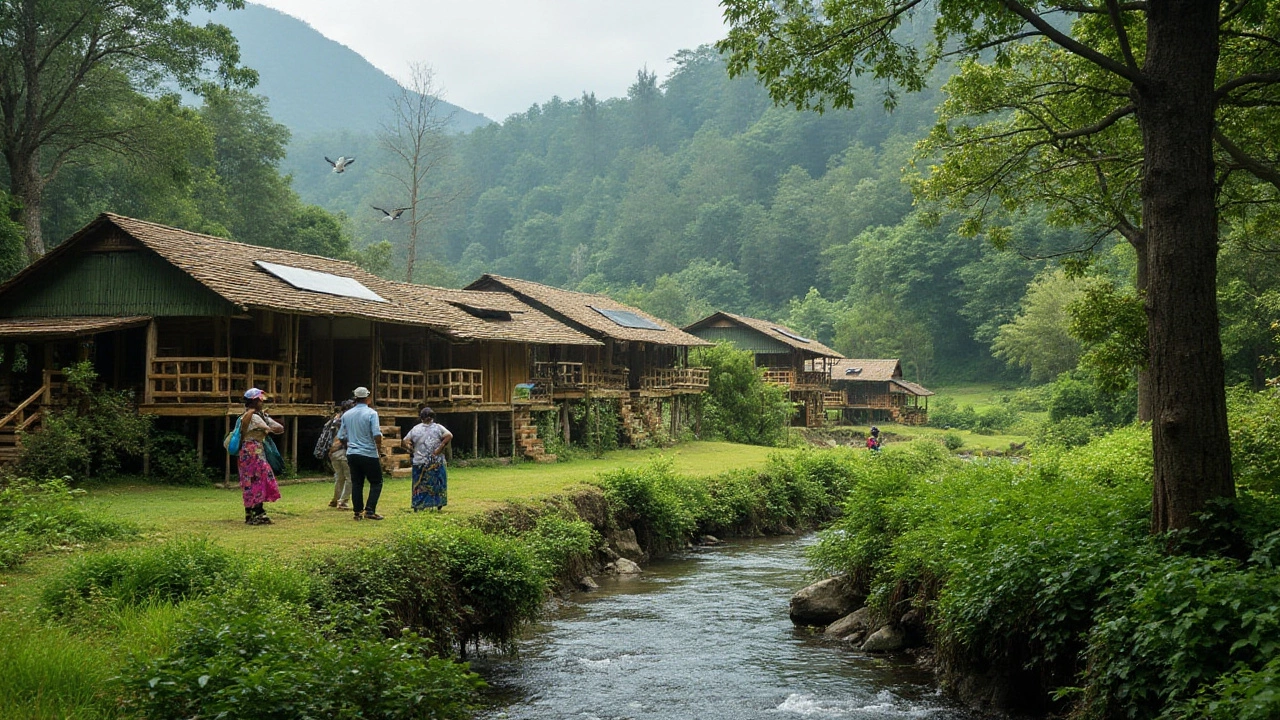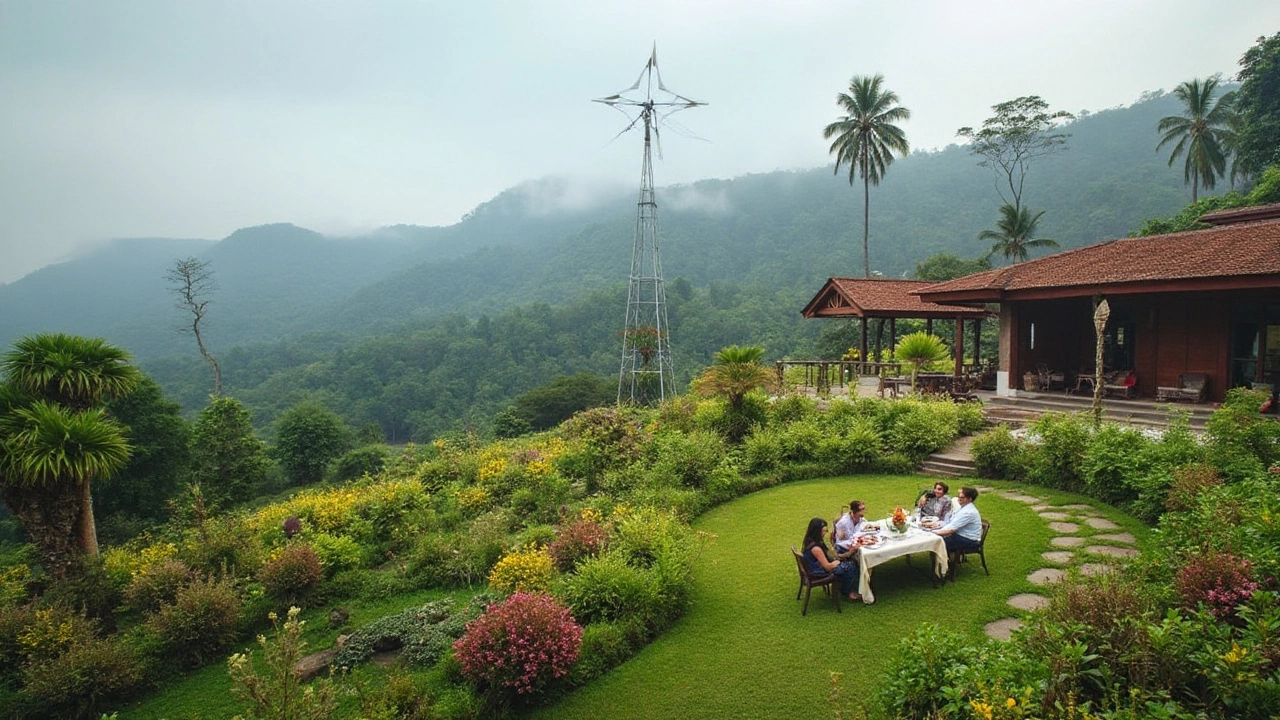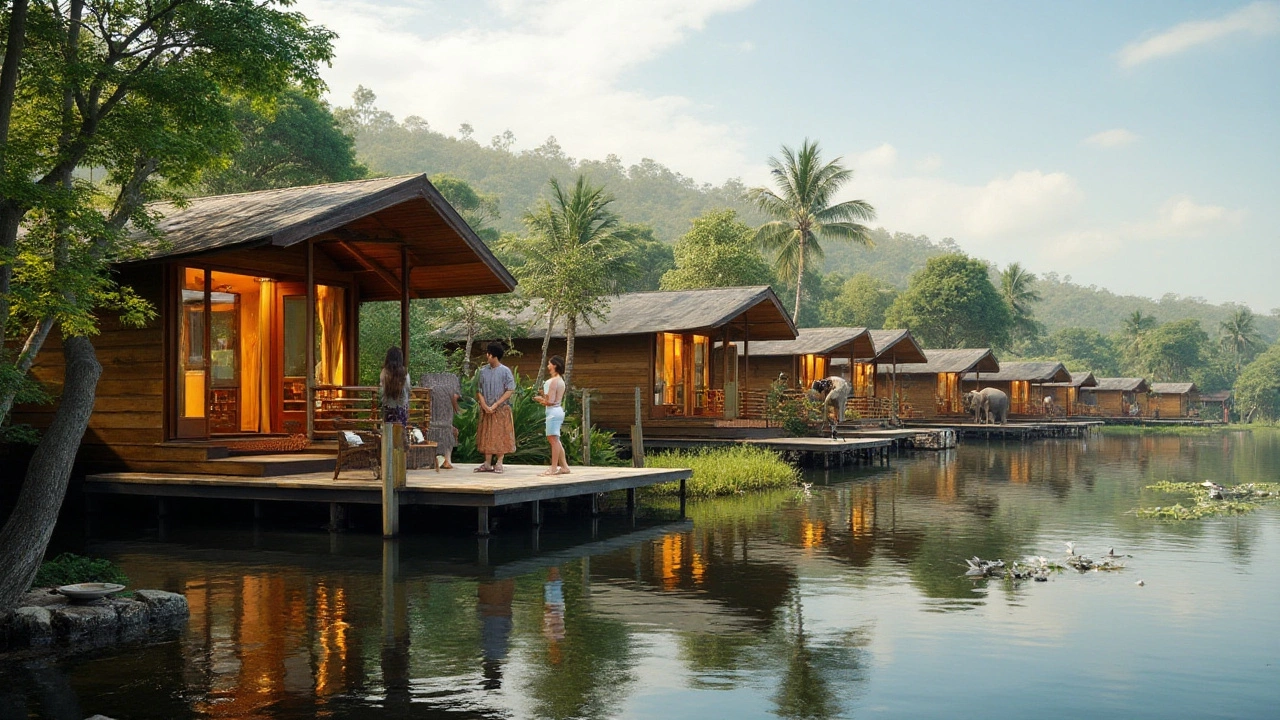What Makes Eco-Tourist Resorts Unique and Sustainable

Imagine waking up to the gentle rustling of leaves, the chirping of native birds, and the breathtaking vistas of an untouched landscape. This is the essence of eco-tourist resorts—a harmonious blend of comfort, nature, and conservation. As the world becomes more environmentally conscious, these resorts have gained prominence by offering unique experiences to travelers who value sustainability and the art of minimal environmental impact.
Eco-tourist resorts are more than just places to stay; they are commitments to preserving local ecosystems and cultures. By integrating green technologies, such as solar panels and rainwater harvesting systems, these resorts reduce their carbon footprint significantly. They also strive to support local communities through fair employment practices and partnerships with indigenous groups, ensuring that tourism dollars contribute positively to the region.
For those new to the concept, choosing the right eco-resort can open doors to a world of education and adventure. These resorts foster a deeper connection with nature through eco-friendly amenities and activities like guided hikes, wildlife tours, and workshops on organic farming or sustainable living. It's an invitation to enjoy a vacation while being a steward of the environment.
- Defining Eco-Tourist Resorts
- Sustainable Practices and Benefits
- Choosing the Right Eco-Resort
- Local Culture and Community Integration
- The Future of Eco-Tourism
Defining Eco-Tourist Resorts
Eco-tourist resorts, a cornerstone of the burgeoning sustainable travel movement, are sanctuaries for both ecological preservation and authentic travel experiences. These unique retreats are built around a philosophy that reveres the natural world. They operate not only as lodging but as conduits for visitors to engage meaningfully with the environment and local cultures. This approach ensures travelers leave with a profound appreciation and understanding of their surroundings, one that both enriches their experience and promotes ongoing conservation efforts once they're back home.
At the heart of every eco-friendly resort is a commitment to minimizing environmental impact through sustainable architecture and operations. Many of these resorts are constructed using locally sourced and recycled materials to seamlessly blend into their settings. Once operational, they often employ renewable energy sources like solar and wind power to ensure their ecological footprint is as small as possible. Water conservation practices, including rainwater capture systems, are frequently implemented to further reduce their dependency on natural resources. Sustainable travel is prioritized through initiatives like growing organic food on-site for guest meals and implementing strict waste management protocols, such as composting and thorough recycling programs.
"The most sustainable way to travel is by ensuring that every step of your journey contributes positively to the local ecosystem and community," notes eco-tourism expert Jane Goodwin.
The integration of eco-tourism resorts into local settings is not solely measured by their physical presence but also by their socio-economic impact. Essential to their definition is a proactive approach to nurturing and supporting local communities. Through employment and collaboration, these resorts often partner with indigenous peoples and nearby towns, offering fair wages and providing training opportunities that boost local economies. This symbiotic relationship ensures that eco-friendly resorts become leaders in sustainable practices that respect and elevate regional cultures, rather than simply extracting their resources for short-term gain.
- Use of renewable energy sources such as solar or wind power
- Implementation of water conservation practices
- Sourcing of organic, local foods
- Commitment to fair trade and partnership with local communities
- Design and build with sustainable materials
By defining these characteristics and practices, it's clear that eco-tourist resorts represent more than just lodging choices. They symbolize a viable pathway toward environmental stewardship and social responsibility within the tourism industry. As we continue to explore and appreciate the wonders of our planet, it is places like these that remind us of the delicate balance required to maintain her natural beauty for generations to come. This dual focus on preserving environmental integrity while fostering human connection is what truly sets eco-tourist resorts apart in the modern travel landscape.
Sustainable Practices and Benefits
In the world of eco-friendly resorts, sustainable practices aren't just a checkbox. They are part of a philosophy that intertwines the welfare of the planet with memorable travel experiences. First off, these resorts employ renewable energy sources like solar and wind power to minimize their carbon footprints. This approach not only reduces the dependency on fossil fuels but also educates guests on the importance of clean energy. Many resorts have implemented waste reduction programs, which include recycling and composting initiatives, to ensure that waste is managed responsibly.
Water conservation is another fundamental aspect of sustainability. Rainwater harvesting systems and greywater recycling enable resorts to use water more efficiently. In some cases, filtered water is offered in glass bottles instead of plastic ones, thereby cutting down on single-use plastics. What's more exciting is when resorts incorporate biophilic design principles, integrating the natural environment into the architecture itself. This not only enhances the property's visual appeal but also provides thermal comfort and better air quality, making nature itself a part of the guest experience.
Another vital component is the focus on supporting local economies. Eco-tourist resorts often source materials and products locally, boosting regional businesses and artisans. Culinary choices in these resorts reflect this commitment as well, with restaurants offering dishes prepared from fresh, local, and often organic ingredients. This practice not only reduces the carbon footprint related to transportation but also allows guests to enjoy authentic local flavors, enriching their travel experience.
Sustainable Travel International states, "By using local resources and supporting indigenous communities, eco-tourist resorts create a win-win situation for both tourism and the environment, fostering a sense of responsibility and respect among travelers."
Digital detoxing and mindfulness activities offer another angle of benefit. Guests at eco-tourist resorts often partake in yoga, meditation, or guided nature walks, focusing on personal well-being and a deeper connection with nature. Besides providing leisure activities, some resorts engage guests in meaningful volunteer opportunities like tree planting or beach clean-ups, which enrich the spirit as much as they nourish the environment. By involving tourists directly in eco-friendly initiatives, these resorts not only educate but inspire guests to adopt sustainable practices in their daily lives.
The benefits do not stop at environmental impacts; they extend into broader social realms. For instance, employment opportunities within these resorts are often offered to local communities, contributing to economic development and cultural heritage preservation. By integrating cultural elements, such as traditional architecture in their designs or promoting local crafts, these resorts provide guests with unique and immersive experiences. It's a testament to how tourism, when guided by eco-conscious principles, can indeed coexist harmoniously with local cultures, offering a rich tapestry of experiences that transcend conventional vacations.

Choosing the Right Eco-Resort
Choosing the right eco-tourist resort is more than just about finding a scenic location; it's about aligning your travel choices with your values on sustainability and environmental consciousness. When you step into the world of eco-tourism, it's essential to consider several factors that contribute to a resort's eco-credentials. One of the first things to examine is the use of renewable energy. Many top-tier eco-friendly resorts position themselves as pioneers in adopting solar, wind, or even geothermal energy sources. These resorts often aim for net-zero emissions, setting a benchmark in sustainable travel.
Another key consideration is a resort's commitment to local culture and economy. A genuine eco-resort will source materials and food locally wherever possible. Unlike conventional tourism models, which often see local resources funneled out of the community, eco-tourist resorts strive to enhance local economies by providing jobs and purchasing from local businesses. For instance, the renowned Six Senses Con Dao in Vietnam is acclaimed for working closely with the local population, creating employment opportunities, and supporting local artisans.
"At Six Senses Con Dao, we believe that our operations must be sustainable and beneficial to the local community. We partner with local suppliers to provide our guests with an authentic and sustainable experience." - Six Senses Con Dao
Evaluating an eco-friendly resort's waste management practices is also crucial. A responsible resort would have a robust recycling program, composting facilities, and a strategy to minimize waste. Some resorts even practice water conservation measures, essential in regions where water scarcity is a major concern. Look for resorts that have received green certifications, like those from the Global Sustainable Tourism Council (GSTC) or Green Key. These reflect adherence to high standards of sustainable and responsible tourism.
When selecting your next green getaway, consider eco-resorts that offer immersive educational experiences. Many resorts provide guests with the opportunity to participate in workshop sessions on sustainable living, organic farming, or local wildlife conservation. Not only do these activities enrich your stay, but they also enhance your understanding of the intricate ecosystems and communities surrounding you. That said, the best eco-resorts balance luxury with low environmental impact, ensuring comfort without compromising on their commitment to nature.
It is also worth noting the strides in innovation that many eco-resorts are making to enhance sustainability. The Finca Rosa Blanca Coffee Farm and Inn in Costa Rica, for instance, is renowned for its involvement in organic coffee production and commitment to ecotourism education. By choosing resorts like these, you can take a proactive step towards reducing your travel carbon footprint and contributing to meaningful ecological and social initiatives.
Local Culture and Community Integration
Eco-tourist resorts often weave the vibrant tapestry of local culture into their fabric, offering guests a rich experience that transcends the typical vacation. By integrating with nearby communities, these resorts not only enhance the visitor's journey but also contribute significantly to the sustainable development of the region. This integration might include local employment opportunities, community-based tourism initiatives, and cultural exchange programs. Research shows that when travelers are engaged with the culture and community, their satisfaction and likelihood of returning soar. For instance, a tourist might partake in a traditional dance class or learn about local culinary techniques, leading to an enriched understanding of the community's heritage.
One of the standout features of an eco-tourist resort is its commitment to supporting the local economy. This is often achieved by sourcing food, materials, and services from nearby businesses. Resorts frequently establish partnerships with local artisans and craftsmen, providing a platform for their products, from handmade textiles to indigenous art, allowing visitors to purchase unique mementos while directly contributing to the artisans' livelihoods. This economic model not only supports the community but also preserves its unique cultural identity in the face of globalization.
In some cases, these resorts also engage in community projects or educational programs aimed at enhancing the local infrastructure or knowledge base. This symbiotic relationship ensures that tourism doesn't become a drain on resources but instead acts as a catalyst for community-led initiatives. By collaborating on projects like water conservation systems or local school improvements, resorts help foster a sense of ownership and pride among community members. A quote from a local leader at the forefront of such initiatives might tout, "Our partnership with the resort has brought not just economic benefits but also revitalized our cultural heritage in ways that we had never imagined possible."
Preserving the natural environment is another critical aspect of local integration. Many eco-tourist resorts are located near protected areas or nature reserves. They work closely with local indigenous populations, who often serve as guides, sharing their unparalleled knowledge of the land. This collaboration helps ensure that tourism activities do not harm these delicate ecosystems. Resorts may offer guests opportunities to participate in conservation efforts, such as wildlife monitoring or tree-planting events, making the trip not just enjoyable but also impactful. This hands-on involvement raises awareness among tourists about the importance of conservation while honoring the stewardship practices of the indigenous peoples.
It's important to highlight how some eco-tourist resorts have formed alliances with non-profits or governmental organizations to bolster community integration further. For example, through joint eco-friendly projects or cultural preservation initiatives, both the community and the guests benefit from strengthened local networks and enhanced eco-responsibility. Engaging with such programs allows travelers to become ambassadors of a simpler and more eco-conscious lifestyle upon returning home.

The Future of Eco-Tourism
As the 21st century unfolds, the path to a sustainable travel revolution is clearer than ever. With eco-tourism increasingly on the radar of conscious travelers and industry experts, it's shaping up to be more than a trend—it's becoming a mainstay of the hospitality world. This shift reflects a growing awareness of the impact that green tourism practices have on preserving the planet and enriching communities. Analysts predict a steady rise in eco-friendly initiatives as travelers demand more than just comfort during their stays; they seek authenticity and sustainability.
In this era, collaboration between eco-tourist resorts and technological innovation is pivotal. The rise of digital platforms and smart technology facilitates transparency and accountability in sustainable practices. Imagine resort management systems monitoring energy consumption and directing resources more efficiently or apps that guide tourists to eco-friendly locations and services. These tools empower guests with information about their ecological footprints and the measures resorts take to mitigate environmental impacts.
The role of policy cannot be understated in driving the future of eco-tourism. Governments play a crucial part in fostering an environment where sustainable practices can thrive. From tax incentives for eco-friendly resorts to regulations that encourage energy-efficient infrastructure, legislative support is vital. Public awareness also hinges on education—schools and universities incorporating eco-tourism in their curricula can foster a new generation of mindful travelers and hosts. For example, a recent UN report highlighted that eco-tourism can contribute to 15% of the global tourism market by 2030, illustrating its expansive potential.
Community engagement remains at the heart of eco-tourism's future. Resorts increasingly recognize that integrating local culture and economy into their operations enhances authenticity while promoting economic stability within host regions. This involves hiring locally, sourcing materials sustainably, and showcasing indigenous traditions and crafts. Such inclusive strategies build long-lasting relationships between tourists and the communities they visit, ensuring benefits are mutual and impactful.
Lastly, the power of storytelling and marketing in eco-tourism cannot be overlooked. As resorts showcase narratives of conservation and community involvement, they set examples and inspire others to follow. Championing stories of wildlife preservation efforts, energy innovation, and cultural heritage attracts not just the environmentally conscious but piques the curiosity of mainstream audiences. As founder of Green Destinations, Albert Salman, once put it, "Tourism can destroy, or tourism can save. Your choice is clear." This dual potential underscores the imperative need for responsible direction in the industry.